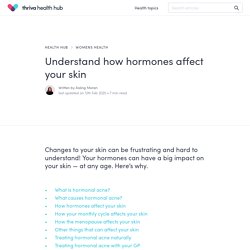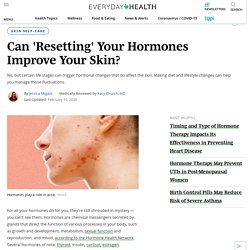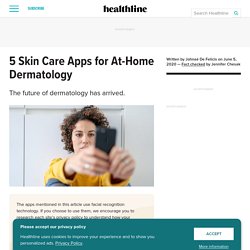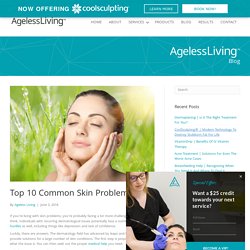

Birmingham City University - Sign In. People living with skin conditions can suffer mental health distress. June 2019 People living with skin conditions such as psoriasis and vitiligo can experience distress and be subject to rude or unwelcome comments from others.

As such skin conditions can affect mental health. Dr Thompson is a Clinical Psychologist specialising in psychological wellbeing in skin conditions, and he acknowledges that there is a gap in services available for people experiencing distress. In one of his recent studies, a person living with rosacea (a condition often confused with acne) was reported as saying: Birmingham City University - Sign In. Understand how hormones affect your skin. Changes to your skin can be frustrating and hard to understand!

Can 'Resetting' Your Hormones Improve Your Skin. For all your hormones do for you, they’re still shrouded in mystery — you can’t see them.

Hormones are chemical messengers secreted by glands that direct the function of various processes in your body, such as growth and development, metabolism, sexual function and reproduction, and mood, according to the Hormone Health Network. Several hormones of note: thyroid, insulin, cortisol, estrogen, progesterone, and testosterone. RELATED: Menopause and Perimenopause 101 Hormones Affect Skin Health in a Variety of Ways Your hormones don’t just control how you feel — they can impact the health of your skin, too.
Hormone levels largely go unnoticed unless there’s something off. Another big hormonal player in skin health is estrogen. Cosmetic dermatology: Five key trends spotted at IMCAS 2020. The global medical aesthetics market is projected to reach USD 17.07 billion by 2023 from USD10.30 billion in 2018.

“Botox and fillers” remains the leading category in terms of value (51.5%) in 2019. That’s an estimated increase of 9.2% yearly until 2023. On the other hand, invasive surgical treatments have fallen by 14.5% over the past year. Trend 1: Artificial intelligence, virtual reality and aesthetics Artificial intelligence and the integration of robotics propelling the industry to another level, was the biggest message coming from the lectures and the exhibitions.
The highlight of the show, no doubt, was the world premiere of NextMotion, a ‘world first’ AI managed injector robot. Virtual reality was another strong theme. Best dermatologist in London - Best skin doctors. If you're searching for a highly experienced London-based dermatologist, we've found six of the best in the business.

Whether your skin concerns revolve around conditions like acne, rosacea, eczema or pigmentation, or you're simply looking for anti-ageing solutions via non-surgical procedures like lasers and injectables, these expert skin doctors deliver results. 5 Teledermatology Apps Changing the Skin Care Space. The future of dermatology has arrived.

The apps mentioned in this article use facial recognition technology. If you choose to use them, we encourage you to research each site’s privacy policy to understand how your information will be stored and used. While these apps are useful for minor to moderate skin care concerns, more serious concerns like mole checks should be done in-person. Skin care tech is having a moment. A big one. With major skin care companies making their entrance into the tech space, and higher demand for interactive, virtual experiences, the shift to a “tech-first” economy has rejuvenated the industry. 8 Of The Most Interesting Skincare Trends For 2021. With 2020 confirming its place as the indisputable year of skincare, what can we expect for the new year?

Here Vogue finds eight of the biggest skin trends for 2021 – from treatments to products – to have on your radar for the most luminous, healthy skin going. Online dermatology will boom Given that statistics show that there are a mere 650 dermatologists in the UK – many of whom haven’t been accessible to their patients during the pandemic – and over 2,000 skin disorders (including maskne and stress-related skin problems), online dermatology is set to become a necessity in 2021. Top 10 Common Dermatology Problems. If you’re living with skin problems, you’re probably facing a lot more challenges than people think.

Individuals with recurring dermatological issues potentially face a number of emotional hurdles as well, including things like depression and lack of confidence. Luckily, there are answers. The dermatology field has advanced by leaps and bounds and can provide solutions for a large number of skin conditions. The first step is pinpointing exactly what the issue is. How Artificial Intelligence Is Being Used In Dermatology. Whether you realize it or not, artificial intelligence is a driving force in the beauty industry at the moment.

Utilizing machine learning, brands are able to not only recommend products to customers but also track how those products are working. However, nowhere is the tech more viable than at the dermatologist’s office, where it could prove to be a powerful diagnostic tool in the hands of experts (and okay, maybe on a Snapchat filter that turns you into an 85-year-old version of yourself, too).
Before we dive into the possibilities that artificial intelligence could have for derms, it’s first important to understand what it is. For some time, algorithms—the most basic form of A.I. White Paper - The Value Shift — Deliver Wellness 3.